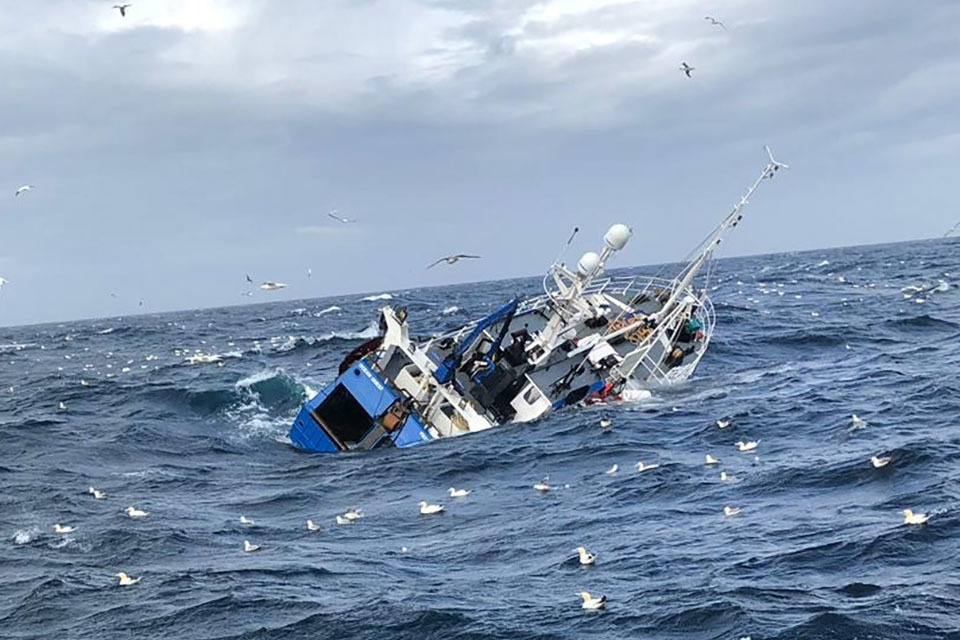Safety flyer to the fishing industry - Ocean Quest
Published 9 April 2021
1. Summary
Flooding and foundering of the trawler Ocean Quest (FR 375) 70 miles north-east of Fraserburgh on 18 August 2019.

Fishing vessel Ocean Quest listing heavily to starboard and sinking
2. Narrative
At 0917 on 18 August 2019, the UK registered trawler Ocean Quest sank, 70 nautical miles north-east of Fraserburgh, Scotland. The loss resulted from a flood in the engine room that could not be brought under control. Once the situation became untenable, the crew abandoned the vessel and were flown ashore to safety in a coastguard helicopter.
The source of the flooding has not been determined; however, the most likely cause was assessed to have been a shell plating or hull weld failure beneath the main engine. This is based on the fact that water was seen welling up underneath the engine in the early stages of the emergency, and this was not an area where any sea water valves or pipework existed. Additionally, sea water cooled machinery continued to run, strongly suggesting that there had not been a failure of sea water pipework. Ocean Quest had also been subject to previous shell plating repairs after hull thickness surveys had detected significant erosion.
3. Safety Lessons
-
It is likely that the onboard pumping effort was not optimised despite the crew quickly starting both the vessel’s general service pumps for bilge pumping, and rigging the portable submersible electric pump. The maximum pumping capacity of the general service pumps was not achieved because the crew partially opened the sea suction valves to help prime the system, and they were then left open after the pumps started. This reduced the amount of water being drawn from the bilge. Bilge pumping systems are critical to vessel safety and their operation must be fully understood.
-
The onboard procedure to partially open the sea suctions was a routine practice by Ocean Quest’s crew to prime the pump and the system when relatively small amounts of bilge water was being pumped out. It is critical to distinguish between routine pumping and an emergency situation, when the maximum pumping effort must be achieved.
-
The crew of Ocean Quest had conducted regular abandonment drills so were well prepared for that phase of the emergency. The alarm was also raised as soon as the situation deteriorated, ensuring rescue assets were on scene at the earliest opportunity.
Our accident investigation report is available at: www.gov.uk/maib-reports/flooding-and-sinking-of-trawler-ocean-quest.
Extract from The United Kingdom Merchant Shipping (Accident Reporting and Investigation) Regulations 2012 – Regulation 5:
The sole objective of the investigation of an accident under the Merchant Shipping (Accident Reporting and Investigation) Regulations 2012 shall be the prevention of future accidents through the ascertainment of its causes and circumstances. It shall not be the purpose of an such investigation to determine liability nor, except so far as is necessary to achieve its objective, to apportion blame.
Note:
This safety flyer is not written with litigation in mind and, pursuant to Regulation 14(14) of the Merchant Shipping (Accident Reporting and Investigation) Regulations 2012, shall be inadmissible in any judicial proceedings whose purpose, or one of whose purposes is to attribute or apportion liability or blame.
Marine Accident Investigation Branch
First Floor, Spring Place
105 Commercial Road
Southampton
SO15 1GH
Email iso@maib.gov.uk
Enquiries during office hours +44 (0)23 8039 5500

